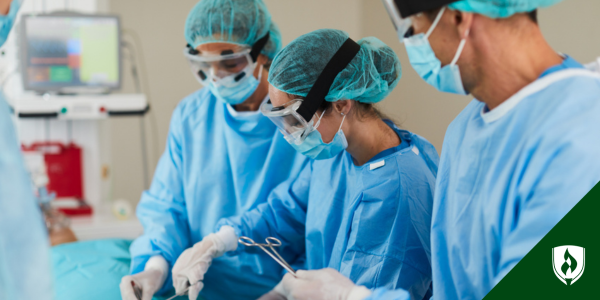
You’re considering a career in healthcare, and it’s a pathway full of possibility. Healthcare demand continues to grow, and there are a range of career opportunities available across all education levels and personality types.
You know that a number of these roles will require education or training beyond what you picked up in high school, but you’d rather not spend several years in school for this new position. That’s what intrigues you about becoming a surgical technologist.
The Rasmussen University Surgical Technologist Associate’s degree program can be completed in as few as 21 months—which means you can obtain your associate's degree, become a certified surgical technologist and start assisting with patient surgeries relatively quickly.1
But how do you know if you’ll actually be good on the job? Are there certain inherent qualities that lend themselves to the profession? To help figure that out, we’ve rounded up a list of traits, tendencies and abilities that you’ll need to become a surgical technologist. If the list below sounds like you, a career in surgical technology may be a fit.
You should consider working as a surgical technologist if…
1. You enjoy working as part of a team
Plenty of jobs require some level of collaboration and teamwork to be effective, but few require the precise coordination needed for working in an operating room. Surgical technologists work with surgeons, registered nurses, a surgical first assistant and other surgical personnel as they perform operations. Not only is that a lot of different medical professionals to work with, they all need to remain entirely on the same page to ensure procedures are completed as safely and efficiently as possible.
It’s important that surgical techs practice seamless coordination and adapt to their operating teams’ movements. Nobody wants to drop a sharp instrument or cause delays because of an awkward handoff. Between transporting patients, adjusting lighting and equipment and managing a whole host of surgical supplies, smooth teamwork is a must for a successful surgical outcome.
2. You’re good with equipment
Speaking of all that surgical equipment, there’s a lot of it involved in surgery. Maintaining surgical equipment is a significant part of a technologist's role. Many surgical technologists manage surgical teams' electrosurgical or electrocautery equipment. This can include argon beam coagulators, spark-gap electrosurgical units, medical staplers, surgical robots and all sorts of specialized tools.
If you’ve always had a knack for fixing cars or working with new gadgets and devices, you might find yourself right at home standing over the operating table, handling the equipment and advanced surgical technology that helps save lives.
This is a very hands-on career.
And the education and training you’ll dig into really reflects that! (For more on that, check out 9 Things You Should Know About Surgical Technologist Programs. They’re a lot more intense and more fun than most people realize!)
3. You’re an excellent listener
Surgical techs need to practice active listening in different types of situations. Whether you’re communicating directly with a patient or closely following the instructions provided by the operating surgeon, you’ll need to be able to lock in and focus on what's being said.
Most surgeons have high expectations of their surgical teams, and mental errors due to a missed cue or a lack of focus are not well-received. It may seem intense, but the bar needs to be set high when patient safety and health are on the line.
4. You’re precise
Are you a meticulous note-taker? Live your life by the “measure twice, cut once” rule of home improvement? Surgical technologists put these tendencies to use every day. For one, they need to keep a careful inventory of all equipment brought into their operating rooms, as lost or forgotten surgical items can lead to serious risks of contracting infections and other health complications.
Additionally, operating room technicians must follow their surgeon’s preference cards down to every detail. These provide an exact list of the equipment and settings needed for the upcoming procedure, and any deviation can cause serious problems or delays.
5. You’re calm under pressure
While a surgical tech's role is to assist with surgery rather than perform it, there is still a great amount of responsibility involved. Every individual in the operating room has the potential to greatly impact a patient's life—and that's no less true for surgical technologists.
While not every procedure a surgical tech will assist with is going to be as intense as emergency surgery, there are still going to be a lot of situations where you’ll need to remain calm and mentally clear under pressure. If you’re able to keep yourself composed when faced with unexpected challenges or issues, you’ll be well-suited for life as a surgical tech.
6. You’re not squeamish
Do you rarely look away when watching horror movies? Don’t bat an eye if your kid gets queasy? These qualities can be an asset for someone in a role that comes with a rare view of the human body—and the not-so-easy-to-stomach elements that come with it.
While it’s hard to know for sure how well you’ll handle the sights of surgery until you’re actually in the room, it certainly helps not to be easily fazed by what most others would shy away from. Preparing you for these realities is an important part of most surgical tech programs.
7. You have above-average fine motor skills
There’s a lot of manual dexterity required for the proper use of surgical tools and machinery. There are assessments that can help determine if you have above-average fine motor abilities, but you can rest assured that your skill is probably better than most if you have great handwriting, play an instrument or have a lot of grip strength.
In the OR, you’ll often find yourself adjusting tools and manipulating objects to achieve the best and most efficient results. A firm, unwavering grip is essential to making sure tools stay sterile and machinery is set at the proper levels.
8. You have a sharp memory
Given that a large part of a surgical technologist's job is passing the surgeon surgical instruments and assisting them with surgical tasks, a surgical tech will need to know the names of hundreds of medical instruments—understanding far more medical terminology than just "scalpel."
Memorizing the names and mastering the usage of all these tools is a major part of a Surgical Technologist degree program and other surgical technologist training programs—and it'll be a huge help if you already have a knack for memorization.
9. You're adaptable
It almost goes without saying: not all surgical procedures go as planned. Along with everyone else in the operating room, surgical technologists will need to be able to react and adapt quickly. There's only so much you can learn about a job like this on paper, and only so far that a predetermined surgical plan can take you.
Once the operating room clock starts, you'll need to be prepared to change up the plan as needed, be responsive as the situation unfolds and think clearly and critically on the spot. You'll not only need to adapt to unexpected situations yourself, you'll need to anticipate how the surgical team will react—and meet their needs at every subsequent step. If expecting the unexpected is your motto, you're on the right track.
Is surgical technology part of your calling?
If you check all the boxes listed above, becoming a surgical technologist might be in the cards for you. This rewarding career will give you the opportunity to work as part of a life-saving team providing crucial patient care, and get your foot in the door of the growing healthcare field.
So, what is it really like to work in this exciting healthcare career? Learn more about the day-to-day demands of surgical tech positions in our article "Surgical Technologist Duties: A Day in the Life."
Related Articles:
- A Peek Behind the Curtain: What Are Surgical Tech Clinicals Really Like?
- What is the Surgical Tech Career Path? From Start to Advancement
1Completion time is dependent on transfer credits accepted and courses completed each term.




